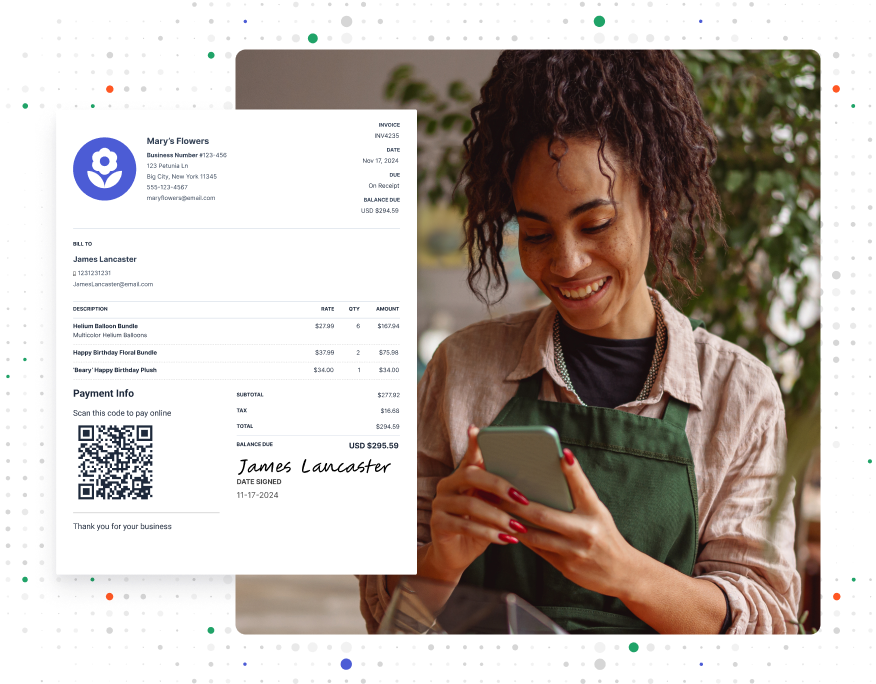20 Small Business Hashtags to Use for Brand Awareness

With over 5.5 billion users worldwide, social media is a content marketing powerhouse and an obvious choice for content distribution. About 73% of marketers use social media platforms to push content.
However, social media is saturated with content. TikTok, for example, gets over 20 million new video uploads every day. It can be difficult for branded content to stand out in a bottomless sea of cat videos, memes, and makeup tutorials.
But there is a simple and clever way to get your content to the right audience. Just incorporate hashtags into your post. These seemingly irrelevant tags are incredibly powerful at drawing audiences.
Hashtags are like street signs, guiding eyeballs to your social posts. If done right, hashtags can help surface your content to audiences interested in what you sell.
This article is a comprehensive guide to hashtags for small business owners. It answers the following questions:
- What are small business hashtags?
- How do social media hashtags work?
- Why are hashtags important for small businesses?
- Where can you use hashtags?
- How will hashtags grow my small business?
- What are the trending hashtags for small businesses?
Let’s dive in.
The Function of Hashtags on Social Media
We’ll start with the basics. What is a hashtag?
In social media, a hashtag is a word or phrase preceded by the hash symbol (#). The hashtag can be placed at the beginning, middle, or end of a social media post. You can also write them in captions and comments.
You can have any word you like in a hashtag. It can even include numbers, but it must be a continuous phrase with no spaces or symbols.
The hashtag was invented by Chris Messina and first used on Twitter (now X) in 2007. While working at Twitter, Chris had the idea to use the pound sign (#) to group related conversations together. As Chris put it, “I’m more interested in simply having a better eavesdropping experience on Twitter.”
Today, the hashtag has grown beyond what its inventor first envisioned. It does let people “eavesdrop,” so to speak, but it’s a lot more than that.
Social media platforms use hashtags as metadata to index and categorize posts, making the content discoverable and searchable. This allows a post to reach more users, even those outside your following.
Here’s a simple example of how hashtags work. Let’s say you’ve created a Facebook post on environmental sustainability. The appropriate hashtags would be something like #GoGreen, #SustainableLiving, or #ZeroWaste. Facebook users looking for sustainability-related content can search or click on those hashtags and find your post.
Additionally, once published, a hashtag becomes a clickable search link. Whenever a user clicks on a hashtag, they see all the content published with that hashtag.
RELATED ARTICLE — How to Build Your Social Media Ads Strategy: Essential Tips
Why You Should Use Small Business Hashtags

Hashtags are optional. Not all social media posts have hashtags. So why go through all the trouble of adding hashtags to your small business content?
Well, here are six reasons why you should use small business hashtags:
1. Connect to your target audience
Hashtags categorize content on social media. Rather than public catch-all posts, hashtags help narrow your target audience. When targeting social media audiences interested in small businesses, hashtags are the way to do it.
2. Increase brand visibility and engagement
Think of hashtags as the SEO equivalent of keywords. Adding hashtags to social media posts drastically increases the content’s visibility, which, in turn, spreads brand awareness and recognition.
They also boost engagement. On Twitter, for example, tweets with hashtags get twice as much engagement as those without.
3. Build communities
Hashtags make your content discoverable to more communities, potentially increasing its reach and engagement. Using hashtags is a great way to reach like-minded individuals and build communities based on common interests.
4. Keep up with trends
Adding trending hashtags to your SMB content shows your brand is in the loop with prevailing trends. Jumping on seasonal hashtags like #AprilFools, #Easter, and #NewMonth lets you capture fleeting interests among social media users.
5. Increase brand reputation
Can using hashtags really help your brand reputation?
Yes, it can.
A hashtag is more than just a tool to discover content. It can represent a belief, mission, opinion, cultural stance, or political statement. The hashtags you choose for your small business can be seen as your association with the hashtag’s deeper meaning.
Using hashtags that truly resonate with your audience and business model can build your brand’s credibility and reputation.
6. Boost SEO strategies
Hashtags make it easier for a larger audience to find and engage with your posts. The more people see your content, the higher the chances that some of them will visit your business website. That’s one way to turn social media audiences into organic web traffic.
RELATED ARTICLE — What Is Online Reputation Management? A Small Business Guide
Social Media Platforms Where You Should Use Small Business Hashtags
Where exactly can you use hashtags?
Although hashtags originated on Twitter, all the mainstream social media platforms support hashtags. Hashtags are essentially universal, even outside digital platforms.
Here are some of the places where you can use small business hashtags:
- Instagram posts
- X (Twitter) tweets
- Facebook posts
- TikTok videos
- LinkedIn updates
- Pinterest pins
- Blog articles
- YouTube video descriptions
- Messaging platforms
- Online forums
RELATED ARTICLE — What Is Customer Acquisition? Strategies and Costs
How to Use Hashtags for Small Business Growth

Hashtags only work if you know how to use them. You can’t just slap hashtags on your post and expect great results. There’s a method to choosing, creating, and publishing small business hashtags.
Here are five ways you can utilize hashtags for business growth:
1. Research Niche Hashtags
Research popular hashtags related to your niche, industry, or business model. Doing so will ensure you choose the right hashtags. You want agreeable hashtags that resonate with your target audience on social media.
Let’s say you run a small plumbing company in your local area. Niche-specific hashtags would be #plumbers, #plumbinglife, #plumbingrepair, #plumbingservices, etc.
Use tools such as Keyhole and Neontools to discover hashtags specific to your niche. Another way to do this is by finding out what hashtags your competitors are using. Borrow some of the hashtag ideas that seem to work.
2. Create Branded Hashtags
Branded hashtags are unique to your business. For example, Coca-Cola uses #coke, #cocacola, and #ShareACoke; these are specific to the Coca-Cola brand.
Branded hashtags are not just for big, well-known brands. You can create some catchy hashtags for your small business, too. Doing so promotes brand awareness, recognition, and association on social media.
3. Mix Hashtags
Combine trendy, niche-specific, and branded hashtags in each post. A good hashtag mix increases your post’s visibility and reach. It’s like casting a wider net in a sea full of fish.
4. Use Relevant Hashtags
Ensure all your hashtags are relevant to your business or niche. Even when using different hashtags for different posts, be consistent about relevance.
For example, if you run a small bakery, there’s no point in adding #fashion to your posts about baking. It doesn’t matter how popular that hashtag is; it won’t bring your content to the right audience. Plus, associating yourself with unfamiliar or unrelated hashtags can reflect poorly on your brand’s credibility and identity.
5. Try a Hashtag Generator
You can always use a hashtag generator if you’re having trouble finding or creating small business hashtags. Tools like All Hashtag, TagsFinder, Inflact, and others can automatically generate or find popular hashtags for your posts.
Remember, though, that hashtag generators come in all shapes and sizes. Some are specific to particular platforms, some are paid, and some are better than others.
RELATED ARTICLE — Communication Methods Within a Business and How to Improve Your Skills
20 Best Trending Hashtags for Small Businesses
On to the big one—which are the best small business hashtags?
Not all hashtags are created equal. Some are more popular and effective than others. To maximize your content’s reach, you must utilize some of the more popular hashtags.
Below is a list of the top trending hashtags for small businesses on Instagram.
- #smallbusiness (110M posts)
- #shoplocal (78.3M posts)
- #supportsmallbusinesses (61.2M posts)
- #smallbusinessowner (22.3M posts)
- #smallbiz (7.3M posts)
- #smallbusinesssuport (5.9M posts)
- #smallbusinessstarturday (3M posts)
- #smallbusinesses (2.4M posts)
- #smallbusinesslove (2.2M posts)
- #smallbusinessowners (2.1M posts)
- #smallbusinesstips (1.4M posts)
- #smallbusinesslife (1.2M posts)
- #smallbusinessmarketing (753K posts)
- #smallbusinesscheck (620K posts)
- #smallbiztips (615K posts)
- #shoplocally (611K posts)
- #smallbizlife (609K posts)
- #smallbusinessgrowth (486K posts)
- #smallbusinesswomen (481K posts)
- #smallbusinessadvice (393K posts)
***We compiled this list from here and here.
5 Tips on How to Use Hashtags for Small Business Owners

Picking the right hashtags is just the first step in the process. There are some unwritten rules about hashtags you ought to know.
Here are five extra tips for harnessing the power of small business hashtags:
1. Don’t overdo it
Use at most six hashtags in a single post. Having too many hashtags makes a post look spammy. Social media users tend to dismiss content that is oversaturated with hashtags.
On the same note, keep the hashtags simple, concise, and memorable. Avoid long, windy hashtags with tricky spellings.
2. Reuse hashtags
As long as your content’s overall theme is consistent, you don’t need unique hashtags for every post. The same goes for posting content on multiple platforms. A hashtag that performs well on Facebook will probably do well on Instagram, too.
3. Conceal your hashtags
Remember that you’re posting content for humans. Nothing, not even hashtags, should interfere with the viewer’s experience.
So, be careful about where you place your hashtags. For starters, don’t cram all your hashtags into a single caption or line. Declutter your post. Spread your hashtags across the comment section, the main text body, and descriptions.
4. Avoid hashtag hijacking
It makes sense to jump on trendy hashtags to get your content to more eyeballs. But not always. If a wildly trending hashtag has nothing to do with your niche, business, or audience, just let it go. Don’t hijack hashtags from other communities or industries; it’s an unsavory social media practice.
5. Track hashtags
Monitor your hashtags. Determine the best-performing ones and maximize their usage. Also, keep a close eye on trending hashtags.
The social media landscape is highly dynamic. The trendiest hashtags today may not be so popular tomorrow, so you have to keep fine-tuning your hashtag strategies.
RELATED ARTICLE — A CRM Guide: 10 Customer Relationship Management Strategies
Top Takeaways for Small Business Hashtags
- Take your time to research hashtags related to your small business, niche, or industry.
- Find the most trending small business hashtags and incorporate them into your posts.
- Create branded hashtags of your own.
- Use hashtag generators to find, create, and analyze relevant hashtags.
- Mind your target audience when choosing hashtags.
- Avoid polarizing or controversial hashtags.
Start Your First
Invoice Today
Create customized and professional
invoices and connect with clients
